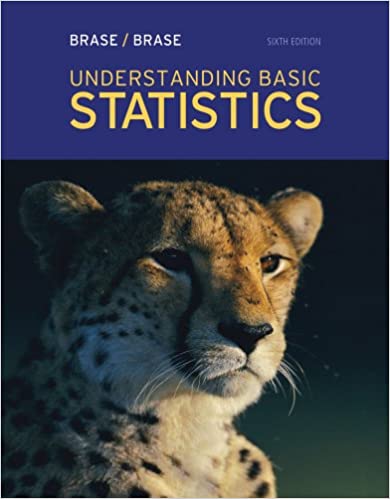
Understanding Basic Statistics 6th Edition by Charles Henry Brase,Corrinne Pellillo Brase
Edition 6ISBN: 978-1111827021
Understanding Basic Statistics 6th Edition by Charles Henry Brase,Corrinne Pellillo Brase
Edition 6ISBN: 978-1111827021 Exercise 43
Provide the following information
(a) What is the level of significance State the null and alternate hypotheses.
(b) Check Requirements What sampling distribution will you use Do you think the sample size is sufficiently large Explain. Compute the value of the sample test statistic.
(c) Find the P -value of the test statistic. Sketch the sampling distribution and show the area corresponding to P -value.
(d) Based on your answer in part (a) to (c), will you reject or fail to reject the null hypothesis Are the data statistically significant at level
(e) Interpret your conclusion in the context of the application.
Medical: Hypertension This problem is based on information taken from The Merck Manual (a reference manual used in most medical and nursing schools). Hypertension is defined as a blood pressure reading over 140 mm Hg systolic and/or over 90 mm Hg diastolic. Hypertension, if not corrected, can cause long-term health problems. In the college-age population (18-24 years), about 9.2% have hypertension. Suppose that a blood donor program is taking place in a college dormitory this week (final exams week). Before each student gives blood, the nurse takes a blood pressure reading. Of 196 donors, it is found that 29 have hypertension. Do these data indicate that the population proportion of students with hypertension during final exams week is higher than 9.2% Use a 5% level of significance.
(a) What is the level of significance State the null and alternate hypotheses.
(b) Check Requirements What sampling distribution will you use Do you think the sample size is sufficiently large Explain. Compute the value of the sample test statistic.
(c) Find the P -value of the test statistic. Sketch the sampling distribution and show the area corresponding to P -value.
(d) Based on your answer in part (a) to (c), will you reject or fail to reject the null hypothesis Are the data statistically significant at level
(e) Interpret your conclusion in the context of the application.
Medical: Hypertension This problem is based on information taken from The Merck Manual (a reference manual used in most medical and nursing schools). Hypertension is defined as a blood pressure reading over 140 mm Hg systolic and/or over 90 mm Hg diastolic. Hypertension, if not corrected, can cause long-term health problems. In the college-age population (18-24 years), about 9.2% have hypertension. Suppose that a blood donor program is taking place in a college dormitory this week (final exams week). Before each student gives blood, the nurse takes a blood pressure reading. Of 196 donors, it is found that 29 have hypertension. Do these data indicate that the population proportion of students with hypertension during final exams week is higher than 9.2% Use a 5% level of significance.
Explanation
a)
b)
The number of trails is n = 19...
Understanding Basic Statistics 6th Edition by Charles Henry Brase,Corrinne Pellillo Brase
Why don’t you like this exercise?
Other Minimum 8 character and maximum 255 character
Character 255


